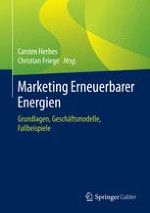2015 | OriginalPaper | Buchkapitel
7. Zielgruppensegmentierung im Ökostrom-Marketing – Ergebnisse einer Conjoint-Analyse deutscher Stromkunden
verfasst von : Dr. Andrea Tabi, Prof. Dr. Stefanie Lena Hille, Prof. Dr. Rolf Wüstenhagen
Erschienen in: Marketing Erneuerbarer Energien
Verlag: Springer Fachmedien Wiesbaden
Aktivieren Sie unsere intelligente Suche, um passende Fachinhalte oder Patente zu finden.
Wählen Sie Textabschnitte aus um mit Künstlicher Intelligenz passenden Patente zu finden. powered by
Markieren Sie Textabschnitte, um KI-gestützt weitere passende Inhalte zu finden. powered by
